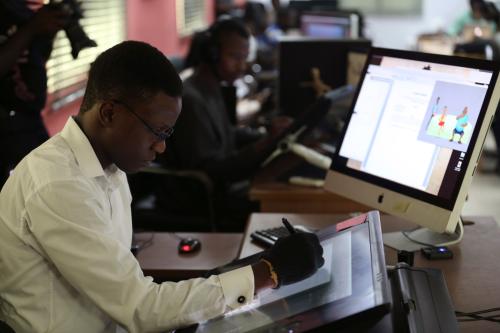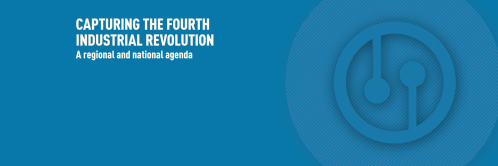Below is a Viewpoint from Chapter 5 of the Foresight Africa 2020 report, which explores six overarching themes that provide opportunities for Africa to overcome its obstacles and spur inclusive growth. Read the full chapter on capturing the Fourth Industrial Revolution.
The future is intelligent: By 2030, artificial intelligence (AI) will add $15.7 trillion to the global GDP, with $6.6 trillion projected to be from increased productivity and $9.1 trillion from consumption effects. Furthermore, augmentation, which allows people and AI to work together to enhance performance, “will create $2.9 trillion of business value and 6.2 billion hours of worker productivity globally.” In a world that is increasingly characterized by enhanced connectivity and where data is as pervasive as it is valuable, Africa has a unique opportunity to leverage new digital technologies to drive large-scale transformation and competitiveness. Africa cannot and should not be left behind.
There are 10 key enabling technologies that will drive Africa’s digital economy, including cybersecurity, cloud computing, big data analytics, blockchain, the Internet of Things, 3D printing, biotechnology, robotics, energy storage, and AI. AI in particular presents countless avenues for both the public and private sectors to optimize solutions to the most crucial problems facing the continent today, especially for struggling industries. For example, in health care, AI solutions can help scarce personnel and facilities do more with less by speeding initial processing, triage, diagnosis, and post-care follow up. Furthermore, AI-based pharmacogenomics applications, which focus on the likely response of an individual to therapeutic drugs based on certain genetic markers, can be used to tailor treatments. Considering the genetic diversity found on the African continent, it is highly likely that the application of these technologies in Africa will result in considerable advancement in medical treatment on a global level.
In agriculture, Abdoulaye Baniré Diallo, co-founder and chief scientific officer of the AI startup My Intelligent Machines, is working with advanced algorithms and machine learning methods to leverage genomic precision in livestock production models. With genomic precision, it is possible to build intelligent breeding programs that minimize the ecological footprint, address changing consumer demands, and contribute to the well-being of people and animals alike through the selection of good genetic characteristics at an early stage of the livestock production process. These are just a few examples that illustrate the transformative potential of AI technology in Africa.
In a world that is increasingly characterized by enhanced connectivity and where data is as pervasive as it is valuable, Africa has a unique opportunity to leverage new digital technologies to drive large-scale transformation and competitiveness. Africa cannot and should not be left behind.
However, a number of structural challenges undermine rapid adoption and implementation of AI on the continent. Inadequate basic and digital infrastructure seriously erodes efforts to activate AI-powered solutions as it reduces crucial connectivity. (For more on strategies to improve Africa’s digital infrastructure, see the viewpoint on page 67 of the full report). A lack of flexible and dynamic regulatory systems also frustrates the growth of a digital ecosystem that favors AI technology, especially as tech leaders want to scale across borders. Furthermore, lack of relevant technical skills, particularly for young people, is a growing threat. This skills gap means that those who would have otherwise been at the forefront of building AI are left out, preventing the continent from harnessing the full potential of transformative technologies and industries.
Similarly, the lack of adequate investments in research and development is an important obstacle. Africa must develop innovative financial instruments and public-private partnerships to fund human capital development, including a focus on industrial research and innovation hubs that bridge the gap between higher education institutions and the private sector to ensure the transition of AI products from lab to market.
At the same time, we must be careful that priority sectors drive the AI strategy in Africa with accompanying products—not the other way around. We believe the health care industry presents by far the most urgent need and promising market opportunity, and, as such, should be put at the top of the list for the continent’s decisionmakers. A large portion of the African population is still unable to access proper health care, with a low patient ratio of one physician per 5,000 patients, and there is almost no country with a fully integrated health management platform. AI could intervene directly to improve personalized health care and product development. Importantly, the health management platform precedes the leveraging of AI, so we must equally invest in cybersecurity, Big Data, cloud computing, and blockchain.
What does this mean for Africa?
Artificial intelligence for Africa presents opportunities to put the continent at the forefront of the Fourth Industrial Revolution. Before Africa can lead this transformation, though, there are important steps that must be undertaken. First, the region needs to formulate a comprehensive continental blueprint to guide its AI strategy by involving key Pan-African institutions, academia, and the private and public sectors in its conception.
In addition, these stakeholders must also invest in creating a digital identity platform for all Africans with reliable data banks for AI to be a viable economic option. For this, it is imperative to leverage readily available local talent as a means to promote and democratize AI technology continent-wide. Finally, we must harmonize regulatory policies that encourage ethically built AI systems so as to guarantee a more inclusive economic development for Africa. With these important steps, the next decade for Africa will be intelligent.









Commentary
The future is intelligent: Harnessing the potential of artificial intelligence in Africa
January 13, 2020